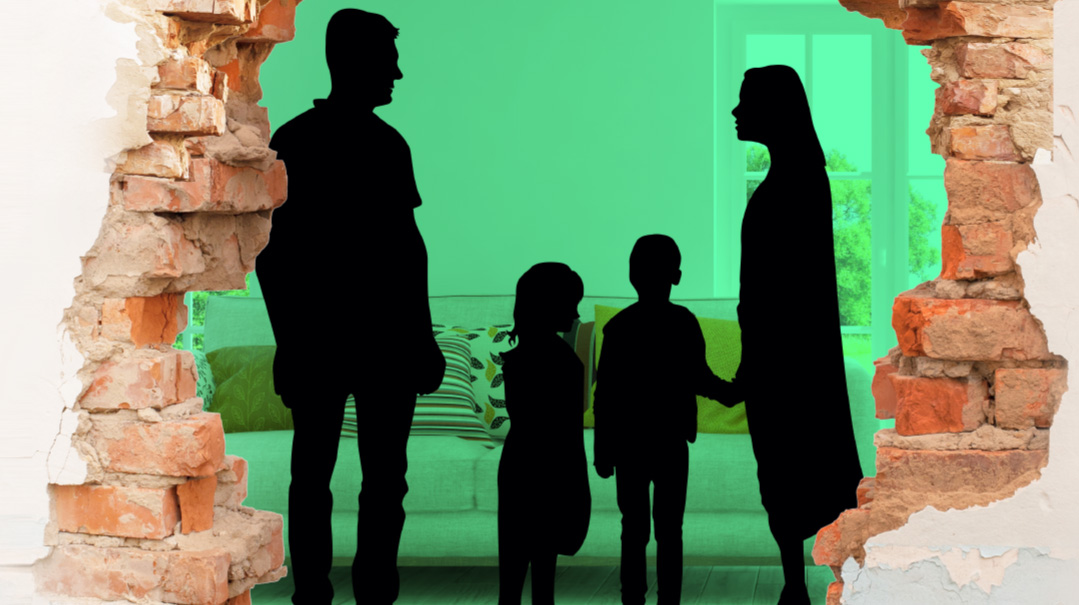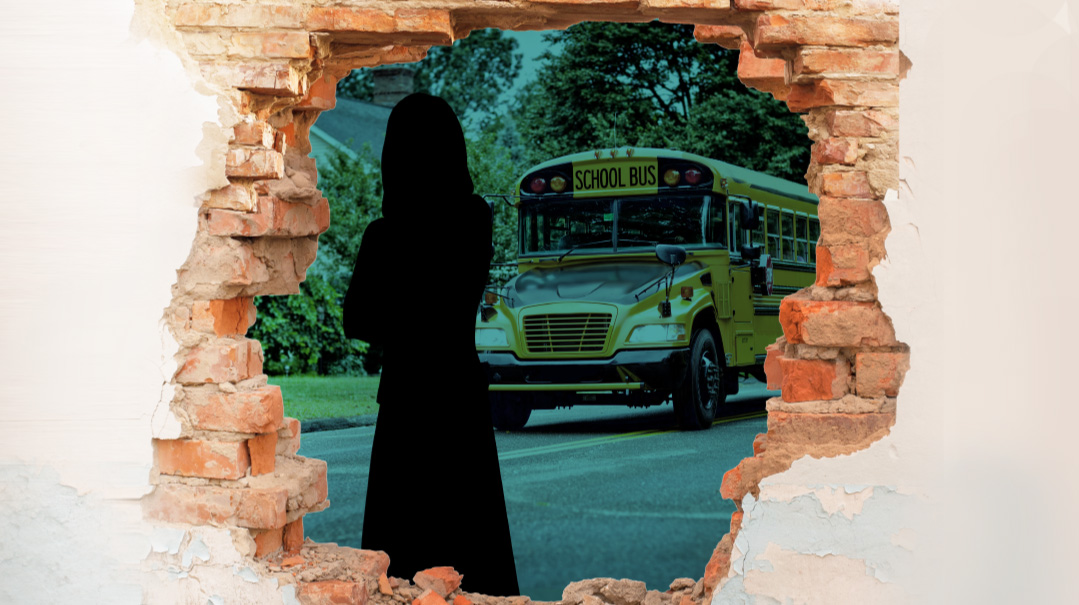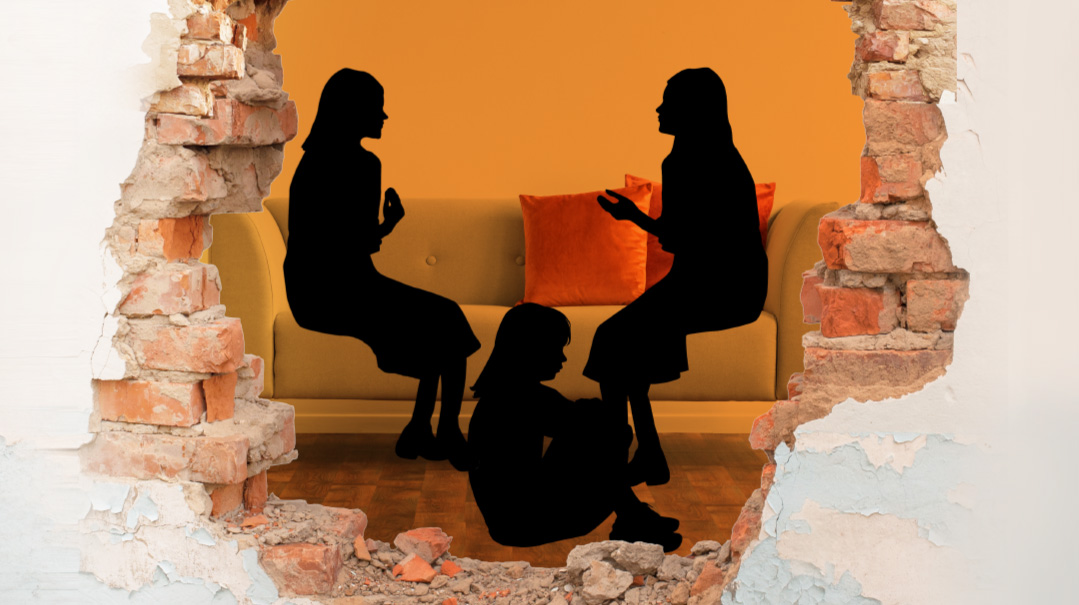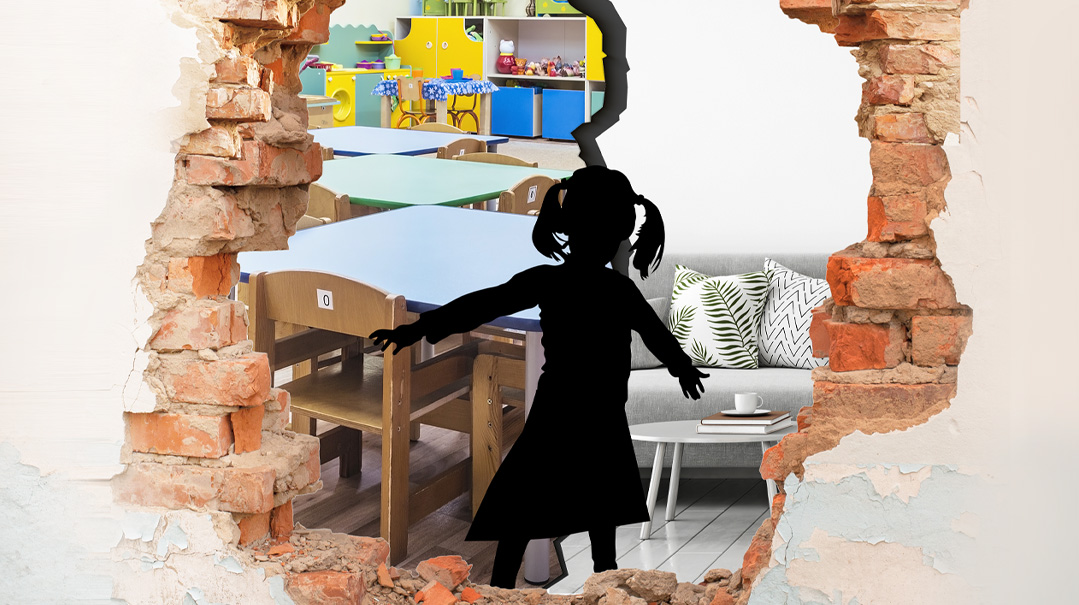Keep My Son at Home… or Move Him to a Group Home?

My special son’s teachers say he should move to a group home — but I want him in mine

I’m at a crossroads in my life and feel very trapped. I’m the mother of a large family, and my middle child, Refael, has special needs. He’s high functioning, but over the years, we’ve weathered a lot of ups and downs.
As Refael nears adulthood, I’ve been advised by many professionals involved in his care to consider a residential apartment geared for his needs. In such a setting, close to home, yet far enough that he can learn to be independent, he’ll learn skills like meal preparation, grocery shopping, laundry — tasks that I can’t manage to teach him with my busy schedule at home.
But I’m so torn about this decision. While I know that obviously other kids grow and fly the coop, Refael will not be leaving to establish his own family. Doesn’t he deserve to stay with family that loves him?
He may initially be excited to be part of a group, but won’t he lose out on the daily gestures of love that come along with living with a warm supportive family? Do I prioritize being a good mother to the rest of my kids, or a mother to Refael who needs me more than the rest?
We’ve consulted with daas Torah who said we could send him, but that whether or not we should send him is a personal decision. How do I decide such a thing? Do I go with what my heart says, to keep Refael close so I can nurture him? Or do I bow to those who may be more objective than me? How can a mother choose?
Always a Mother
Rabbi Zev Leff is rav and rosh kollel of Moshav Mattisyahu, Israel. He is a prolific writer as well as a renowned international lecturer and teacher. In addition, Rabbi Leff serves as scholar in residence for many institutions.
As I’m not familiar with the details of this specific situation, I can only give some general guidelines that will enable this woman to make a proper decision.
First, what is the best option for the development and condition of her son with special needs? Will, in fact, most of his needs be provided for in the assisted-living facility better than at home? It’s worth noting that enabling him to gain skills and giving him a social environment will guarantee him a brighter future for the time when eventually his parents will not be able provide him with care.
Second, will his parents be able to visit him often and provide him with the parental love that’s also very necessary? Will they be able to bring him home for some Shabbosos and other special times?
Third, what impact will the presence or absence of the special needs child in the home have on the other children? If, in fact, both the special needs child and the other children will benefit from his being in the facility, then this mother’s love for all of them is expressed by enabling him to be in the facility.
Fourth, a mother’s need to shower her child with love is a reality, but this serves the mother’s need and isn’t necessarily for the child’s benefit. This mother should realize that, as the Michtav MeEliyahu writes, love is rooted in giving, and a loving relationship is engendered by giving. She should internalize the feeling that by giving her son what’s really best for him, she is in fact expressing her true motherly love.
Finally, this mother should never feel she’s abandoning her son, but rather providing him with what Hashem has decreed he needs in the most positive fashion.
If all these conditions are as I presented them, my feeling is that putting him in the facility is what daas HaTorah would recommend. However, if any of the conditions are different from what I described, then further consultations with Torah and professional sources would be recommended.
I offer the family a bircas hedyot that they have siyata d’Shmaya in making the right decision and in seeing nachas from all of their children, and for all their children to derive nachas from them.
Dr. Pinchas Lerner is a clinical psychologist who has spent the last 38 years as clinical director of Mekor — a premium agency and recipient of the State Award for Excellence, which serves the special-needs community through its 30-plus New York-based residences.
The decision to place a child with special needs in a residential home is a challenging one, on par with other major life decisions, such as whom to marry, where to live, and what career to pursue.
It’s a uniquely personal choice and only the parents of the individual have the scope of knowledge and sensitivity to recognize all the factors that must be weighed in making the decision. It’s further essential to utilize the assistance of a family rav who knows the child and family to assist in making this decision.
Our policy is not to tell parents which decision we believe they should make, but to provide enough information about our residences so that they can make an informed choice.
Some factors that need to be weighed: On a social level, will my child benefit from more opportunities to develop peer friendships? Conversely, might my child be losing the friendly shul and community he’s grown up with?
On the medical front, will my child’s health issues be dealt with in the same intensely concerned and detail-oriented fashion as at home? Might the presence of a nurse, a trained staff, and legal requirements focusing on health care actually improve the quality of my child’s medical care?
Family-centered concerns are also a major factor. It is vital that parents weigh the effect of such a move on their shalom bayis and the needs of the other siblings in the family.
Classically, placement of a sibling with special needs is good for other siblings, as it allows them to receive the attention that was previously diverted to the special sibling, reduces tension in the home, and alleviates the peer stigma of a special sibling.
However, this dynamic is definitely not universal. Although the final decision belongs to the parent, it’s wise to include the siblings in pre-placement discussions.
It’s also essential to weigh all the aspects of the specific residence in question, to determine whether it meets the specific needs of the individual. Residences vary tremendously in many factors, such as the functioning level and age of the residents, the nature of programming, and the medical and psychiatric issues of the residents. A residence may be optimal for one and inappropriate for another.
Parents should consider the adhesiveness of the group. How do they interact socially, and are they compatible in terms of their physical and/or emotional needs and strengths?
For example, individuals with physical challenges may need environmental modifications of their living area to ambulate safely. Individuals with communication difficulties may need training in adaptive devices to facilitate their communication. Those who enjoy Torah learning can join learning sessions in the residence, while those with computer, baking, or cooking skills can likewise be accommodated.
For our part, we hire staff who are naturally warm and supportive and invest a great deal of training in fostering unconditional positive regard for the individuals living with us. Our staff focuses on each person as a unique individual with specific needs and strengths, a perspective that enables them to foster love and respect for every individual.
Having laid out many of the technical factors involved in decision-making, I’d like to address one more issue in this mother’s inquiry. Parental love cannot be duplicated. Yet parents must realize that they’re not giving up their parental relationship by placing their child in a residence.
Parents continue to have frequent opportunity for close contact, on visits home for Shabbos or Yom Tov, phone calls, and other remote contacts. During these opportunities, the parent actually has the chance to express unconditional positive feelings without the pressure of moment-to-moment disciplining and daily functioning. As mentioned before, the overall atmosphere of the home may be much less tension filled, leading to a more natural and higher level of bonding between the child with special needs and his family.
Baruch Hashem, the vast majority of individuals in our residences lead happy, fulfilling lives, and the vast majority of families have been happy with their decision to place their children in residences. As with all major decisions in our life, we trust that Hashem will guide us properly and take good care of the Yiddishe neshamos He has entrusted to us.
Ahava Ehrenpreis is a longtime Mishpacha contributor and author of On My Own… But Not Alone (ArtScroll). Her son Saadya a”h was a resident at Makor Disability Services in Brooklyn, New York.
I can fully identify with the terrible quandary that you’re facing. The natural instinct of every mother is to protect and nurture their child. That instinct becomes sharpened and intensified when a mother is given the challenge of a child with special needs.
Though you know that the One Above determines to whom this child was entrusted, there probably is still a niggling voice suggesting that if you’d be a “perfect mother,” your child would have no issues! All those motherly instincts are magnified to perhaps an irrational level, yet this natural response — the desire to allow no stone to be unturned, to give that special child anything and everything that will make his life better — must be channeled properly to achieve the results you want for your child.
When it’s not properly channeled, this drive can cause parents to lose sight of a much bigger picture: the welfare of other members of the family and sometimes even the welfare of the mother herself. It’s very hard to see the whole picture when you’re in the epicenter of the storm. Your preoccupation with the welfare of your special child may be overriding the needs of other family members, even subconsciously. Or you may think, “My other kids have what they need, Hashem gave them natural advantages that their special sibling wasn’t blessed with.”
Whether conscious or subconscious, these emotions are real. Now let’s look at the situation from the perspective of your son, Refael. You want what’s best for him. Who better than you, his devoted and loving mother, can know or understand him? Who can provide for his needs with greater concern than you? No one, absolutely no one!
But perhaps there really are needs you cannot address. Many may be related to his challenges, but he has other needs, which everyone has as they mature. We protect our little ones; we hold out our arms when they begin to toddle precariously. But one day, they no longer need this assistance and we step back and allow them to walk independently. That’s the way it’s supposed to be, otherwise their limbs and muscles would never develop enough to support their weight.
Refael is no different. He, too, needs to have the opportunity to develop his muscles of independence. His self-esteem and his awareness of what life is “supposed” to be like also need to be addressed. Just as his siblings will grow and develop the ability to live independent lives, Refael, too, should be given that opportunity.
Obviously, the environment must be the right one; determining that is your responsibility. You’d never want your other children to marry heedlessly, without making efforts to determine if the person will be a suitable match. So, too, this is even more critical for a special child, who may lack the discretion on his own to determine if this is the right situation. Your nurturing, protecting nature must be utilized here to seek out the best possible placement for him.
To suggest a few criteria: the number and functioning level of other residents, whether they would be a positive fit as companions and peers for Refael, the quality of the staffing, the reputation of the organization, the length of time of employment, and the staff turnover. Speak to other parents who have children in that particular residence. What is the attitude of the organization or residence regarding parent involvement? You can be aware and involved with his life, even if he is not under your roof.
We live in a wonderful time in history for individuals with special needs, with options for independence that didn’t exist even half a century ago. The degree of acceptance and awareness among society is monumental.
And as Refael’s loving mother, the energy and concern you’ve always expended to care for him can now serve to help you find the best possible situation for him to grow as an adult.
This isn’t an easy or quick adjustment. But try to remember that you’re not giving him up any more than you are abandoning a child when he or she marries or moves out of your home as an adult. You’re giving Refael the opportunity to grow, to interact with his peers, to develop a sense of self-esteem, to do what’s the natural progression in the circle of meaningful life.
(Originally featured in Family First, Issue 719)
Oops! We could not locate your form.







